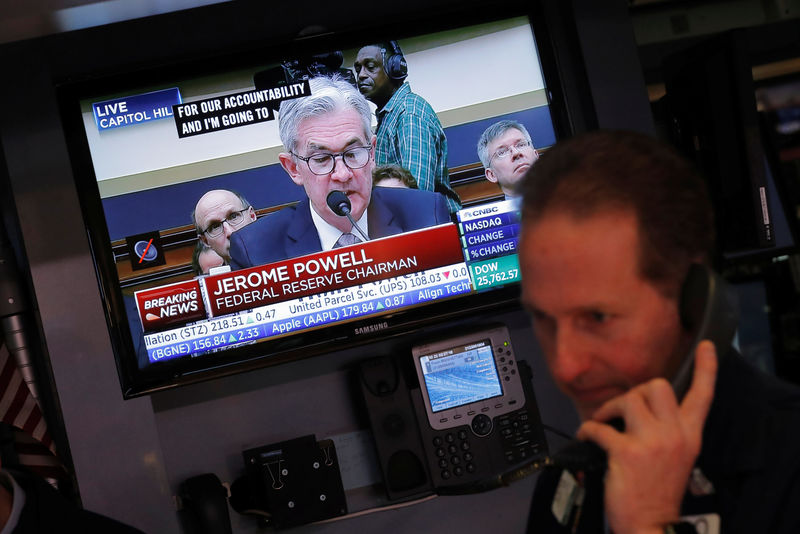By Geoffrey Smith
Investing.com -- The Federal Reserve won't change interest rates or the rate of bond purchases, but will issue new guidance and growth forecasts when its two-day meeting ends later. It will also say whether it intends to end or extend a loophole on bank capital requirements that could have a big impact on the bond market in the near term. One central bank that may well hike rates later is Brazil's. Samsung warned that the global chip shortage isn't going away any time soon, and the International Energy Agency played down talk of a new 'supercycle' for oil, reminding everyone that prices are still being propped up artificially by the OPEC+ bloc. Here's what you need to know in financial markets on Wednesday, March 17th.
1. Fed meeting ends; dot-plot, SLR ruling eyed
The Federal Reserve will announce its monetary policy decision at 2 PM ET (1800 GMT), and Chairman Jerome Powell’s press conference will follow half an hour later.
No changes to the rate of asset purchases or to key interest rates are likely, so market attention will focus on the Fed’s guidance – specifically, on whether the ‘dot plot’ of Fed officials rate expectations shift to reflect an earlier tightening of policy than assumed hitherto. The Fed’s current guidance implies no rate hikes until 2024, but the rise in bond yields in recent weeks has implied market expectations of an earlier move.
Also of note: the Fed will decide on whether or not to extend the current exemption for banks from the Supplementary Leverage Ratio as a binding capital requirement, which is due to expire at the end of March. If the exemption is not extended, banks may find themselves less able to make payouts to shareholders, and to absorb the huge volume of Treasury bonds being issued this year.
2. Here's one central bank that will hike
In contrast to the Federal Reserve, which believes that inflation is not a near-term risk, the Central Bank of Brazil meets Wednesday against a backdrop of rapidly rising prices and a sharp loss of confidence in the policies of President Jair Bolsonaro.
The BCB is expected to raise its key rate by 50 basis points to 2.50%, in a bid to stop a slide in the real that has lost over 10% against the dollar in the last three months, as inflation has risen to a four-year high of over 5%.
Brazil’s move is likely to herald a broader shift to tighter monetary policy by emerging market central banks, especially those whose currencies have come under pressure as the dollar has started to strengthen. The central banks of Turkey and Russia are also expected to issue more hawkish guidance this week, even if they do not raise their own key rates.
3. Stocks set to open mixed; UBER gives up fight in U.K.
U.S. stocks are set to open mixed in narrow ranges as volatility dies down ahead of the Fed’s announcement later.
By 6:30 AM ET (1030 GMT), Dow Jones futures and S&P 500 futures were effectively flat, while Nasdaq 100 futures were down 0.2%, reversing Tuesday’s modest gains.
Before the Fed announcement, there will be February data on housing starts and building permits, as well as weekly numbers on mortgage rates and refinancing, one of the first sectors of the economy likely to slow in a rising rate scenario.
Stocks likely to be in focus include Uber (NYSE:UBER), which finally gave up its battle in the U.K. not to treat its drivers as workers, as well as Alphabet (NASDAQ:GOOGL) and Apple (NASDAQ:AAPL), after Google cut the fee it charges app developers to 15% from 30% for the first $1 million they earn through the Google Play store. The move is unlikely to satisfy app developers such as Fortnite publisher Epic Games, which have filed antitrust lawsuits in various jurisdictions against what they see as monopolistic fee structures.
4. Samsung warns of semiconductor shortage
Samsung (KS:005930) warned of a “serious imbalance” in the global market for semiconductors, adding that the problem is unlikely to be solved in the near future.
Co-CEO Koh Dong-jin told the company’s annual shareholder meeting that the company’s foundry in Austin, Texas, is still offline due to reconfiguration after the cold snap that forced it to stop operations last month.
The closure of that foundry, along with other facilities owned by Texas Instruments (NASDAQ:TXN), has aggravated a supply shortage that led Honda to suspend some U.S. production on Wednesday. Toyota said production would also be hit by a shortage of some specialty petrochemicals, in another example of how the pandemic has exposed the fragility of complex global supply chains.
5. IEA plays down talk of supercycle
Crude oil prices edged lower overnight after the International Energy Agency played down talk of a new ‘supercycle’ in its latest monthly report on the state of the oil market. It pointed to still-high levels of inventories (on a historical comparison) and the fact that prices are being supported by the withdrawal of some 8 million barrels a day of output by the ‘OPEC+’ deal.
Advanced economy stockpiles fell for six straight months through January, but were still 63.2 million barrels above their 5-year average and 110 million above year-earlier levels, the IEA said.
U.S. government data on weekly stockpile changes are due at 10:30 AM ET, as usual.
